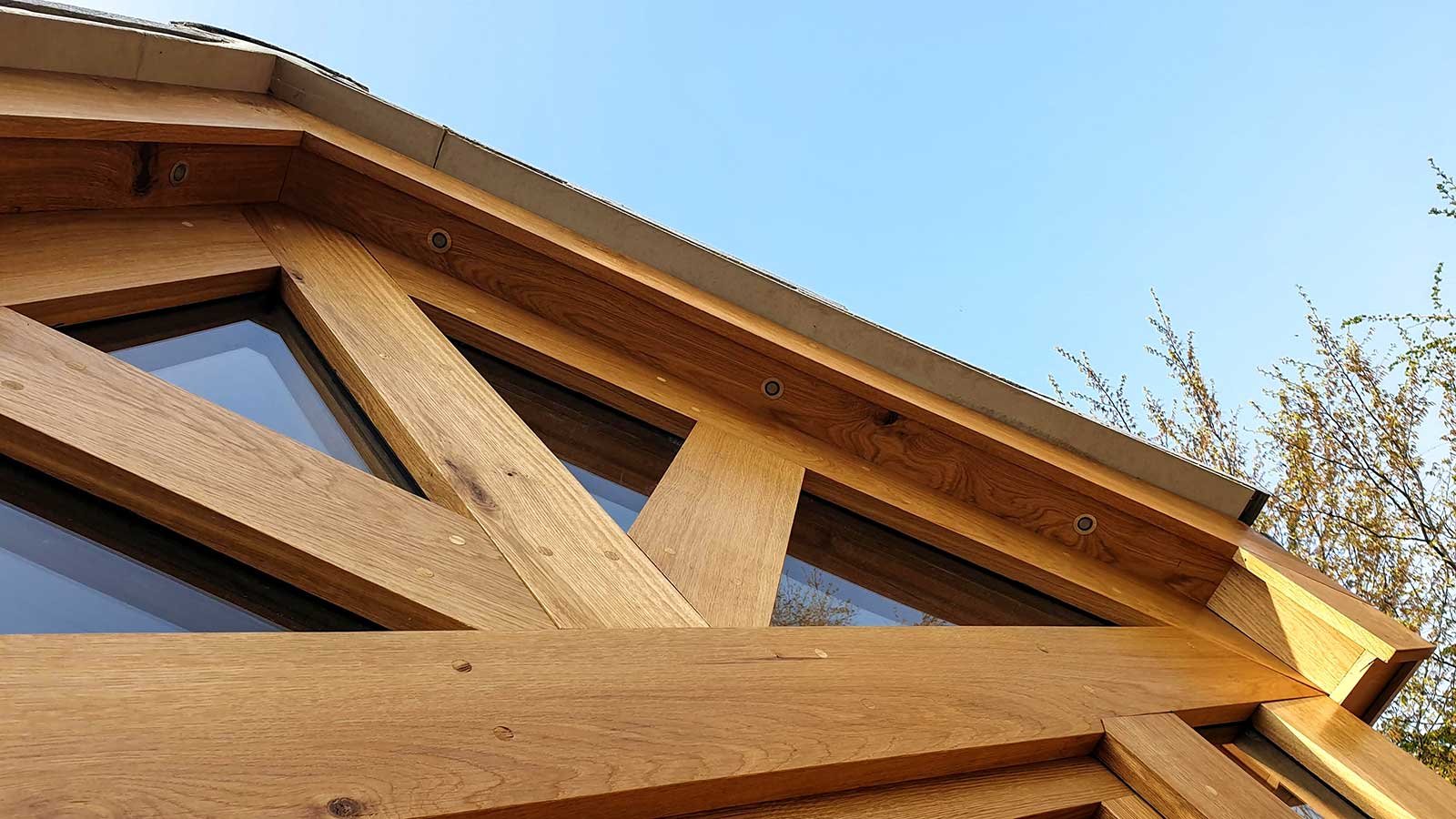
oakbydesign
01423 593 794


Denise Turner contacted Oak By Design after admiring many oak products seen on their website.
Living in a redbrick property on a York village’s Main Street, Deborah wanted to add more character to the front of her home, whilst also providing additional space when entering her home.
Her home had a lean to entrance that also incorporated the extended living room window.
Jamie Winspear, of Oak By Design, visited the property and came up with a design for a new glazed oak porch that increased the entrance floor area and gave Denise’s home the additional character she hoped for. She also needed the groundwork’s for the proposed porch, insulation of the porch area, an internal door and frame fitting, plaster boarding and some re-wiring.
Jamie provided a quotation, along with design drawings, which Denise accepted. They both discussed the proposed works.
With the ground works completed and the glazed oak porch manufactured, the Oak By Design installation team installed the porch, along with the other requirements.
An approved electrician, Jason at JH Electrical carried out the electrical work.
Integrated lighting was installed on the overhang area in front of the oak truss.
An oak door and frame, with full-length glazed unit form the front of the porch. The solid oak door has a multi-point locking system for security and pewter handle and letterbox.
The truss design has a main king post (central upright post) and 2 diagonal braces, all glazed with our unique glazing system.
The right hand side of the porch features 2 full length glazed units, and the left hand side features one, to fit in with the existing structure.
Oak fascia’s and soffits finish the porch and guttering fixed to complete the porch.
As the roof rafters are covered with insulation and ceiling board, on the ceiling of the porch, oak rafters were retro fit to give the entrance a cosy characterful feel.
The existing house roof had to accommodate the ridge and back rafters of the porch roof. New slates and ridge tiles finished off the porch, fitting into the new roofline.
The entrance to the home is now very characterful and has given the property an entrance to be proud of.
The new enclosed oak porch and the extra space it has provided, has given Denise just what she wanted and it’s safe to say she’s absolutely thrilled with it all!
Double glazing, also known as a double glazed unit (DGU), is a widely used element in building construction due to its numerous benefits. This article aims to discuss the advantages of double glazing within the context of thermal insulation.
The primary advantage of incorporating double glazing into building design lies in its ability to provide effective thermal insulation. By utilising two sheets of glass separated by a spacer bar, an air gap is created within the DGU, which can be filled with an insulating gas. This configuration acts as a thermal barrier, preventing heat from escaping and cold air from infiltrating a room.
To illustrate this phenomenon, we can imagine the DGU functioning like a sandwich. The sheets of glass serve as the bread slices while the air gap represents the filling. Just as a sandwich preserves warmth and prevents external elements from permeating it, double glazing similarly retains heat within enclosed spaces while impeding cold drafts from entering.
This enhanced insulation results in improved energy efficiency for buildings that incorporate double glazed windows. By reducing heat loss during colder months and minimising heat gain during warmer months, these windows contribute to maintaining comfortable indoor temperatures without excessive reliance on heating or cooling systems.
In conclusion, through its thermal insulation properties, double glazing plays a crucial role in enhancing the energy efficiency of buildings. By utilising this technology, builders can create more sustainable structures that optimise comfort while reducing energy consumption and associated costs over time.
Oak porches are a valuable addition to any home, providing both aesthetic appeal and functional benefits. These structures serve as an elegant entrance feature that enhances the overall appearance of your property. Similar to a well-crafted piece of furniture, an oak porch seamlessly blends with the architectural style of your house, creating a harmonious and visually pleasing effect.
In terms of durability and longevity, oak is renowned for its strength and resistance to decay. An oak porch, therefore, offers exceptional durability that can withstand harsh weather conditions and other environmental factors. Its robustness ensures that you have a sturdy structure that will last for generations with minimal maintenance required.
Moreover, an oak porch provides practical advantages by offering additional space for storage or sheltered areas. Whether it is used as a place to store muddy boots or as a cozy spot to enjoy the outdoors during inclement weather, an oak porch extends the functionality of your home.
Furthermore, these porches can increase the value of your property due to their timeless beauty and enduring quality. Potential buyers often perceive an oak porch as a desirable feature when considering purchasing a home.
In conclusion, investing in an oak porch brings numerous benefits to homeowners. From its elegant appearance that seamlessly integrates into any architectural style to its durability and practicality, this structure adds value both aesthetically and functionally. Consider adding an oak porch to enhance your home's charm while enjoying its long-lasting qualities for years to come.
The utilisation of timber in construction is a time-honoured tradition, with oak being a popular choice due to its durability and aesthetic appeal. However, there are distinct differences between green oak and air-dried oak that warrant careful consideration when selecting the appropriate material for building projects.
Green oak is derived from recently felled trees, retaining a substantial moisture content ranging from 60-80%. As this timber undergoes seasoning, which refers to the gradual drying out process, its moisture content diminishes. The visual imagery of water gradually evaporating from the wood aptly depicts this transformation.
In contrast to green oak, air-dried oak is cut into desired sizes and exposed to natural elements for an extended period. This exposure allows for air circulation between the timbers, facilitating the reduction in moisture content over time. The pace at which air-dried oak dries out is captured by the evocative phrase "25mm per year," highlighting the slow but steady progress of drying.
Air-dried oak possesses lower moisture content compared to green oak due to its lengthy seasoning period, typically ranging from three to ten years depending on thickness. This reduced moisture content enhances stability and minimises movements or shrinkage associated with timber use in construction projects.
Telephone: 01423 593 794
Locksley Park
Blind Lane
Tockwith
YORK YO26 7QJ
Opening Times:
Mon to Fri - 9.00am to 5.00pm
Bank Holidays - Closed
Christmas 2025- TBC
Oak By Design is the trading name of:
Oak By Design Ltd.
Reg Number: 04384416
VAT Number: 664 8012 33